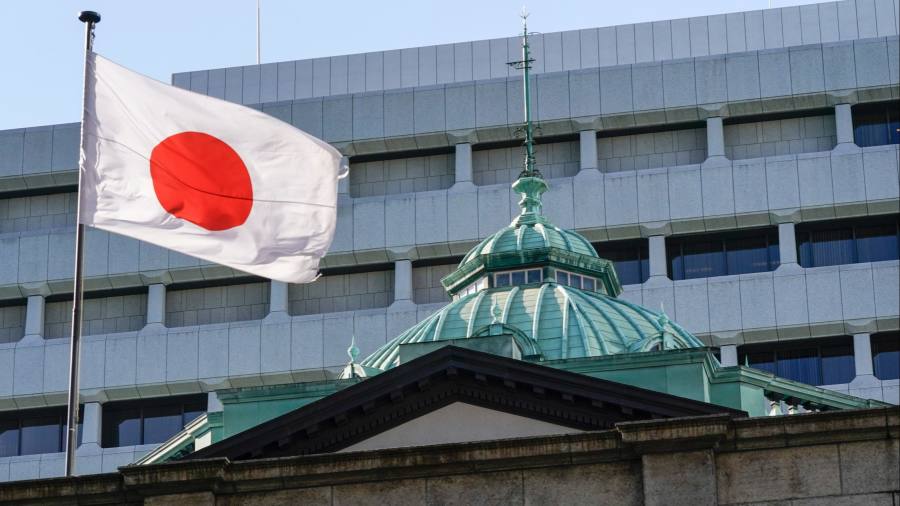Receive free Japanese government bonds updates
We’ll send you a myFT Daily Digest email rounding up the latest Japanese government bonds news every morning.
Global investors are poised for days of uncertainty as bond, currency and equity markets absorb a landmark shift from the Bank of Japan to allow bond yields to rise more freely, a decision that analysts said marked a significant step towards unwinding decades of ultra-accommodative monetary policy.
Kazuo Ueda, the BoJ’s new governor, announced on Friday that the central bank would loosen its grip over the benchmark 10-year Japanese government bonds, in effect doubling the trading range for the yields of long-dated debt.
The shock decision, which the BoJ denied represented a policy change, was tantamount to calling time on a controversial, seven-year monetary experiment known as yield curve control that set Japan’s central bank far apart from global peers, analysts said.
Ueda’s move, which initially stirred investor confusion and was described as “opaque”, in effect widened the band within which 10-year JGB yields would be allowed to trade from 0.5 per cent to 1 per cent. The bank added that it would officially retain its 0.5 per cent cap on yields as a “reference”.
“This is ‘de facto’ abolishment of yield curve control, at least for the time being,” UBS chief Japan economist Masamichi Adachi wrote in a report. “No introduction of the policy rate guidance suggests that the bank left open the near-term policy rate hike optionality.”
The decision opened the way for a potential shift in Japan’s status and fundamental changes in global investment flows. The practical end of yield curve controls marked what investors said was a definitive step towards policy normalisation after decades of deflation and economic stagnation and seven years of negative interest rates.
“What is clear to us is that with this change today there will be a repatriation of money from abroad into Japan, which will affect equities as well,” said Luca Paolini, chief strategist at Pictet. “Japan is ending deflation so Japan becomes a more normal place to invest.”
But veteran BoJ-watchers warned against concluding that the central bank was on the brink of tightening. The relaxation of the yield band was intended to signal concern to markets about the rising risk of inflation and the long-term distortion of bond markets.
The BoJ added on Friday that its overnight interest rate would remain minus 0.1 per cent — Japan is the only country in the world to maintain negative rates — while calling for more time to settle at its 2 per cent inflation target.
“Does it presage a full-blown tightening? Almost certainly not,” said Peter Tasker, co-founder of Arcus Investment. “So as long as rates are negative at the short end, there is a limit to how far the 10-year yield can rise,” Tasker added.
The 10-year JGB yield rose to as much as 0.572 per cent — the highest level in nine years — following the BoJ’s announcement before falling back. Analysts said the yield was unlikely to breach the new ceiling of 1 per cent.
Most experts do not expect the BoJ to abandon negative interest rates until next year at the earliest, when the central bank has forecast inflation will fall back below its 2 per cent target. Headline inflation hit 3.3 per cent in June, and the BoJ on Friday upgraded its core inflation projection for fiscal 2023 from 1.8 to 2.5 per cent, while lowering its fiscal 2024 forecast to 1.9 per cent.
Ueda also said the yen’s recent volatility against the dollar had played a part in the BoJ’s decision. Some analysts said this statement — the first acknowledgment linking the currency’s recent weakness to a change in yield curve controls — could create significant market uncertainty over the possibility of political intervention in the level of the yen.
“It’s not good if there is suspicion that the BoJ is responding to complaints from the government that they do not want the weaker yen,” said Tetsuya Inoue, a former BoJ official who is now a senior researcher at Nomura Research Institute.
Several currency analysts argued that while the psychological significance of the BoJ’s move was high, it was unlikely to trigger a major investor rethink on the yen, predicting a brief phase of currency volatility but no lasting change to the currency’s weakness. After choppy trading on Friday, the yen went into the weekend at about ¥141 against the dollar, roughly its level ahead of the BoJ’s decision.
Kamakshya Trivedi, a currency strategist at Goldman Sachs who described Ueda’s move as a “giant leap” for the BoJ but only a “small step” for the yen, said that while the currency could climb higher in coming days as the market explores the parameters of the central bank’s flexibility, sustained appreciation was probably not on the cards.
“It would take a more substantial policy turn to offset stronger global risk sentiment, which tends to weigh on the yen, and the rate differential makes it unlikely that this will prompt significant repatriation back to Japanese assets,” Trivedi wrote in a report to clients.
Ueda emphasised that the BoJ intended to sustain easing measures while it determined whether recent wage rises would continue into next year.
Robert Tipp, chief global investment strategist and head of global bonds for PGIM Fixed Income, argued that the central bank was buying time. “It wants to see whether wage growth is organic or the result of pressure from government,” he said.
Read the full article here




